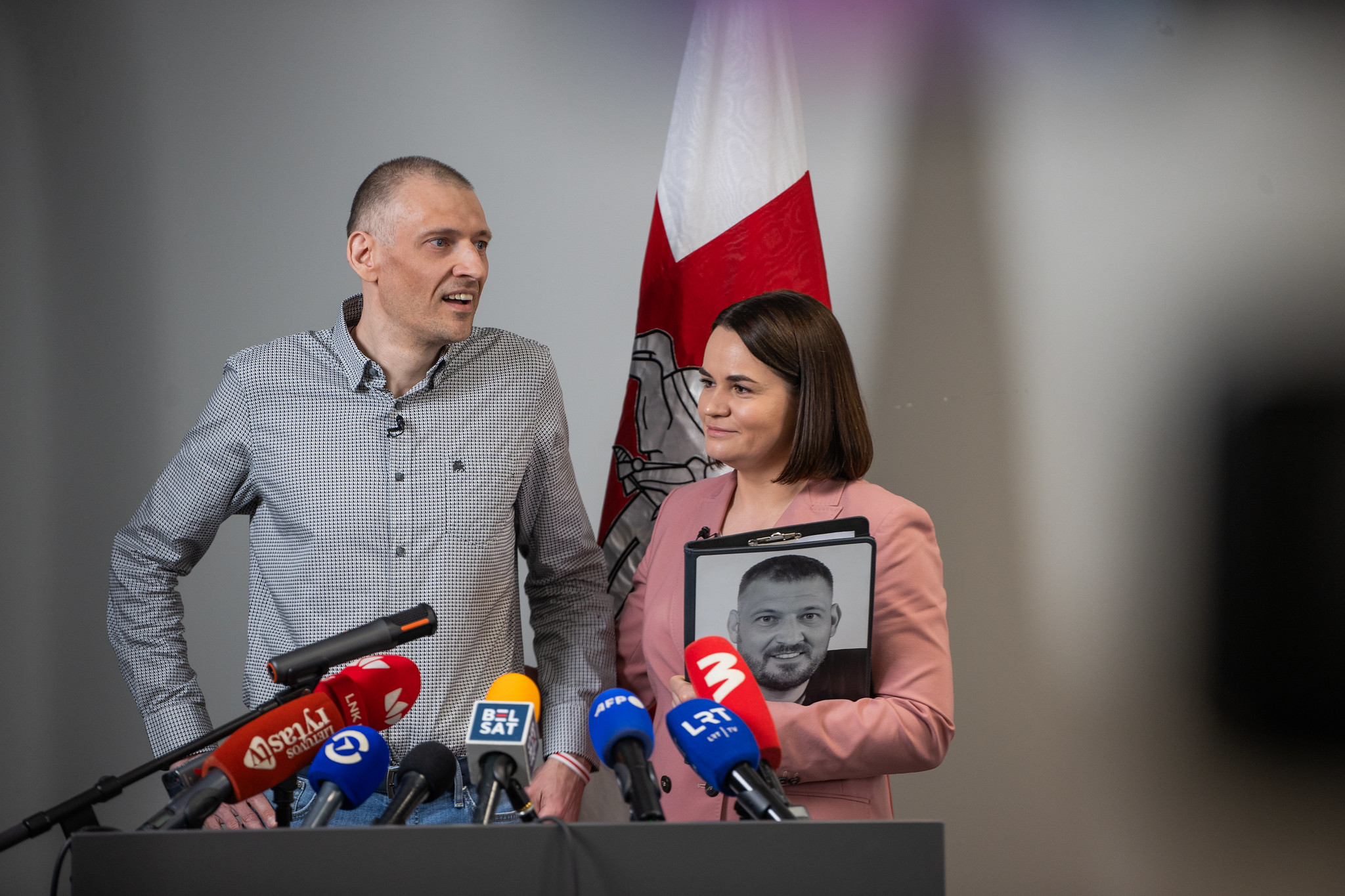This article first appeared in Volume 54, Issue 3 of our print edition of Index on Censorship, titled Truth, trust and tricksters: Free expression in the age of AI, published on 30 September 2025. Read more about the issue here.
At the end of June, Belarusians witnessed something close to a miracle. After meeting with US Special Envoy for Ukraine Keith Kellogg, Belarusian dictator Alyaksandr Lukashenka “pardoned” and deported to Lithuania a group of political prisoners: five Belarusians and nine foreign nationals.
Among them were former Radio Free Europe/Radio Liberty journalist Ihar Karnei and Minsk State Linguistic University associate linguistics professor Natallia Dulina. Most unexpectedly, they also included Siarhei Tsikhanouski, blogger and activist, the first to challenge Lukashenka in the 2020 election. He is the husband of Sviatlana Tsikhanouskaya, who stepped into her husband’s political shoes when he was jailed and who many consider Belarus’s president-elect.
Index went to Lithuania and Poland to speak with these three.
Tsikhanouski was arrested in May 2020 shortly after he announced his plans to run for the presidency in opposition to Lukashenka. He was eventually charged with organising mass unrest and fuelling social hatred, and sentenced to 18 years in prison, with an extra one and a half years added during his sentence for supposedly breaking prison rules. He spent more than two years incommunicado before his unexpected release this summer.
In October 2022, Dulina was put behind bars for public order offences and promoting extremist activities, after she took part in peaceful protests. She was sentenced to three and a half years in a penal colony.
Karnei, a journalist, was arrested in July 2023 and charged with participating in an extremist group. After being sentenced to three years in prison, he was transferred to a penal colony, where he was placed in a punitive isolation cell.
In June, the three with 11 others went through a forced exile and were delivered to the Lithuanian border with bags on their heads, absolutely uninformed. The next thing they heard was: “It’s all right guys, you are under the protection of American diplomacy – you are free.”
Below, Tsikhanouski, Dulina and Karnei share, in their own words, a glimpse of what it means to be a political prisoner in Belarus. And while 14 were released in June, there are nearly 1,300 political prisoners still being held in penal colonies in Belarus.
Siarhei Tsikhanouski
 My arrest and criminal case clearly show that I was persecuted solely for my words. I was prosecuted for defending freedom of speech and the right to share information. The charges they invented had no evidence whatsoever – nothing was presented in court. The regime doesn’t even understand what a real court is. What they have has nothing to do with justice.
My arrest and criminal case clearly show that I was persecuted solely for my words. I was prosecuted for defending freedom of speech and the right to share information. The charges they invented had no evidence whatsoever – nothing was presented in court. The regime doesn’t even understand what a real court is. What they have has nothing to do with justice.
When you’re tried, Stalin-style, inside the prison itself, behind closed doors, your lawyers can’t defend you. Meanwhile, on state TV, they broadcast false and defamatory claims, but neither I nor my lawyers can respond. Sitting in prison “with my mouth shut,” I couldn’t even make a final statement. People couldn’t hear my evidence of innocence or my arguments – nothing. The regime throws out baseless accusations and hands down long sentences. My trial lasted about six months.
It’s absurd. The UN Working Group on Arbitrary Detention had already ruled that my detention was arbitrary and therefore illegal. But the regime didn’t care.
This is how the justice system works in Belarus: when the dictator appoints the head of the Investigative Committee, the prosecutor general, the head of the KGB and the ministers, he appoints everyone. He also appoints judges by his own decree. Our constitution states there is a separation of powers, three branches
of government, but in reality this does not exist. He appoints everyone by his decrees, and they carry out his will.
And it turns out that it is impossible to fight this within the framework of the law. Impossible. We suffered not because we fought in some way outside the law, but because we spoke up, exposed and showed it. Accordingly, they engaged their instruments of force and simply put everyone who did not stay silent and spoke out into prison.
Ihar Karnei
 From the very start, a segregation process begins in prisons. Those convicted under so-called “extremist” articles – which cover a wide range of charges, from participating in public gatherings to posting comments allegedly insulting the honour and dignity of officials and the president – are stripped of nearly all rights.
From the very start, a segregation process begins in prisons. Those convicted under so-called “extremist” articles – which cover a wide range of charges, from participating in public gatherings to posting comments allegedly insulting the honour and dignity of officials and the president – are stripped of nearly all rights.
Such prisoners are immediately labelled “malicious violators of prison rules”. Often, there is no real basis for this, but it’s simply the procedure: a person is automatically considered to be breaking internal regulations in detention facilities.
On this basis, they are placed on a preventive register, meaning they are under heightened scrutiny from their first day in a penal institution. Usually, they are subjected to all possible punishments: disciplinary cells, denial of parcels and packages from relatives, and bans on any visits.
Political prisoners – marked with yellow tags – are even denied the right to visit the library, use the sports yard or attend church, despite small chapels existing in all colonies. Torture by solitary confinement is common. I spent almost six months in a medium-security colony in Shklou. In total, I spent 160 days in solitary confinement there.
Natallia Dulina
 After a long period in prison, people often feel disoriented when they are released. Reactions vary. Some initially experience euphoria and joy at being reunited with loved ones, but may struggle to adjust to the changed reality. At first, they might feel okay, but many have told me that after a while, psychological problems begin. The original traumas don’t disappear – they’re deeply buried but eventually resurface.
After a long period in prison, people often feel disoriented when they are released. Reactions vary. Some initially experience euphoria and joy at being reunited with loved ones, but may struggle to adjust to the changed reality. At first, they might feel okay, but many have told me that after a while, psychological problems begin. The original traumas don’t disappear – they’re deeply buried but eventually resurface.
I have personally experienced this in two ways. During short administrative arrests, the first time I was released, I felt very bad – scared, as if they were about to come for me again. I went through that fear, processed it, let it out and felt relief. Later, after subsequent short arrests, I was able to resume life as if nothing had happened. But those were very brief detentions.
Now, I have been released outside Belarus. I think if I had returned home, I would feel better – because being in exile brings its own challenges. My case is unusual, as my release was forced. I was taken out of the country without my knowledge, blindfolded, with no explanation of where I was being moved. In the first days, the anger and despair over still having no control over my life overshadowed everything else.
Thanks to the support I received in exile – practical, financial, and from friends – it became much easier for me. And perhaps one of the important things were the words of my loved ones. Now, they too have breathed a sigh of relief, and for their peace of mind, I am ready to face personal difficulties.





